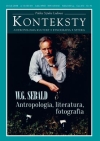Porządek identyfikacji. Indeksalność kolekcji / archiwum Józefa Robakowskiego
Identification Order. The Indexicality of the Józef Robakowski Collection / Archive
Author(s): Marta LeśniakowskaSubject(s): Anthropology
Published by: Instytut Sztuki Polskiej Akademii Nauk
Keywords: Józef Robakowski
Summary/Abstract: This text deals with the “archival turn“ and discusses one of the most important Polish private collections of avantgarde art formed since the 1950s by the leading conceptual artist Józef Robakowski. The author’s point of departure is the assumption that the purpose of collecting is the creation of a canon of cultural values, and thus that collecting is the outcome of selecting and systematising facts/objects according to a priori established rules; for this reason it only ostensibly possesses all the features of neutrality. Actually, no collection is neutral since it personifies power inscribed into accumulating, collecting, and gathering as well as encyclopaedic order and rules of the language (Alan Sekula). Private art collections are the effect and image of individual passions, predilections, sometimes manias and obsessions, and build closed and stable testimonies of cultural identity. Archives-collections established by artists are a special case since they are part of artistic strategy, are enrooted in art, and perform work associated with creativity. This fact discloses a certain performative quality of the collection/archive linked with the generation of a private iconosphere, a Derridean “domesticated” archive that constitutes the discourse of the artist-collector with, and about art, also within the domain of “pure” art, which is already only one of the possibilities of artistic strategy. The discussed exhibition was the product of the “domesticated” art collection amassed by Robakowski, and in this manner it builds inter-textual space, ambiguous and connected with its re-[de]-contextualisation. The Robakowski private collection/archive is a conceptual game played with cultural paradigms, originating from the conceptual art of the 1960s and its anti-authoritarian stands conceived as the “great refusal”. The manner of its distribution is part of the conceptual order as a form of artistic organisation and production. At this stage essential questions are yielded by the comprehension of conceptualism by artists living in communist Eastern Europe, where the purpose of conceptualism was not “refusal“ but the involvement of art as a critique of the regime in which it was embedded. This is why the “museum-archival” project proposed by Józef Robakowski, and entailing the collection of objets d’art and documents, focused on memory and history, together with faith in the reanimation ability to “revive” the source and “recreate” the inaccessible past.
Journal: Konteksty
- Issue Year: 2014
- Issue No: 3-4
- Page Range: 297-306
- Page Count: 10
- Language: Polish
- Content File-PDF

